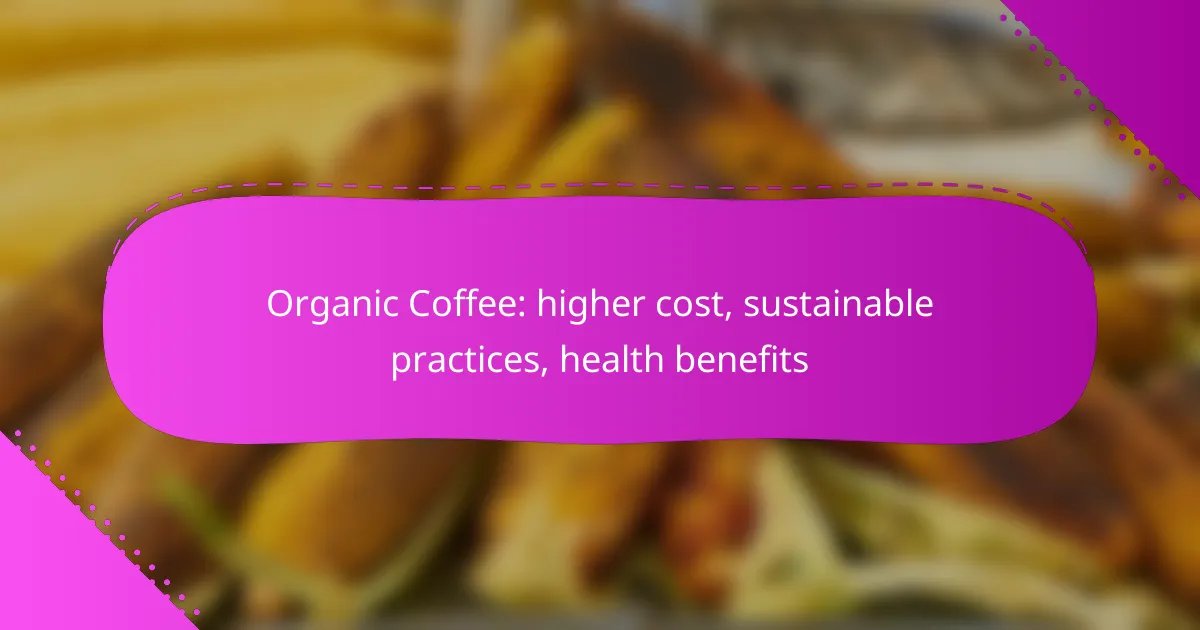Organic coffee, while often more expensive due to higher production costs and certification requirements, embodies a commitment to sustainable practices that benefit both the environment and farming communities. By prioritizing biodiversity and ecological health, organic coffee not only enhances quality but also offers significant health benefits, being free from synthetic pesticides and richer in beneficial compounds. Choosing organic coffee supports a healthier lifestyle and a more sustainable future.

Why is organic coffee more expensive in New Zealand?
Organic coffee tends to be more expensive in New Zealand due to several factors, including higher production costs, certification expenses, and market demand. These elements contribute to the overall pricing structure, making organic options less accessible than conventional coffee.
Higher production costs
The cultivation of organic coffee involves more labor-intensive practices and sustainable farming methods, which can significantly increase production costs. Farmers often use natural fertilizers and pest control methods instead of synthetic chemicals, leading to lower yields and higher labor expenses.
Additionally, organic coffee farms may require more time and resources to maintain soil health and biodiversity, further driving up costs. As a result, these factors are reflected in the retail price of organic coffee in New Zealand.
Certification expenses
Obtaining organic certification is a rigorous process that incurs various costs for farmers. In New Zealand, growers must adhere to strict standards set by organizations like BioGro or AsureQuality, which require regular inspections and documentation.
The fees associated with certification can be substantial, especially for small-scale farmers. These costs are often passed on to consumers, contributing to the higher price of organic coffee.
Import tariffs
New Zealand imposes import tariffs on certain goods, including coffee, which can affect the pricing of organic varieties. While some organic coffees are sourced locally, many are imported from countries where they are grown, and tariffs can add to the overall cost.
These tariffs can vary depending on trade agreements and the country of origin, making it essential for consumers to consider how these factors influence the final price of organic coffee in the market.
Market demand
The growing consumer preference for organic products has led to increased demand for organic coffee in New Zealand. As more people become aware of the health benefits and environmental sustainability associated with organic farming, the market for these products expands.
This heightened demand can drive prices up, as consumers are often willing to pay a premium for organic options. Consequently, the balance of supply and demand plays a significant role in the pricing of organic coffee.
Small-scale farming
Many organic coffee producers operate on a small scale, which can limit their ability to achieve economies of scale. Smaller farms often have higher per-unit costs due to less efficient production methods and limited access to resources.
While small-scale farming can lead to higher quality and more sustainable practices, it also means that the prices for organic coffee are generally higher compared to mass-produced alternatives. Consumers should consider supporting these farmers for their commitment to sustainable practices, despite the increased costs.

What sustainable practices are used in organic coffee production?
Organic coffee production employs various sustainable practices that prioritize environmental health and biodiversity. These methods not only enhance the quality of the coffee but also contribute to the well-being of farming communities and ecosystems.
Shade-grown cultivation
Shade-grown cultivation involves planting coffee under a canopy of trees, which mimics the natural habitat of coffee plants. This method helps maintain biodiversity, providing shelter for birds and other wildlife while reducing the need for chemical fertilizers and pesticides. Additionally, it can improve coffee quality by protecting the plants from direct sunlight and extreme weather conditions.
Farmers practicing shade-grown techniques often see benefits such as improved soil moisture retention and reduced erosion. This approach can lead to higher-quality beans, which can command better prices in the market.
Natural pest control
Natural pest control in organic coffee farming focuses on using beneficial insects and organic methods to manage pests instead of synthetic chemicals. Techniques include introducing predatory insects, using insect traps, and planting pest-repellent plants nearby. This not only protects the coffee plants but also promotes a healthier ecosystem.
Farmers can reduce costs associated with chemical pest control while enhancing the sustainability of their practices. Additionally, consumers increasingly prefer coffee produced without harmful pesticides, making this approach commercially viable.
Soil health management
Soil health management is crucial in organic coffee production, emphasizing practices that enhance soil fertility and structure. Techniques such as composting, crop rotation, and cover cropping help maintain nutrient levels and prevent soil degradation. Healthy soil leads to stronger coffee plants and better yields.
Farmers can also benefit from reduced dependency on external fertilizers, which can be costly. By focusing on soil health, they create a more resilient farming system that can withstand climate variability.
Water conservation techniques
Water conservation techniques in organic coffee farming include practices such as drip irrigation, rainwater harvesting, and mulching. These methods help minimize water usage while ensuring that coffee plants receive adequate moisture. Efficient water management is essential, especially in regions prone to drought.
Implementing these techniques can lead to significant cost savings and improved sustainability. Farmers who adopt water conservation strategies often find that they can maintain productivity even in challenging climatic conditions.

What are the health benefits of organic coffee?
Organic coffee offers several health benefits due to its cultivation methods and absence of synthetic pesticides. It is often richer in beneficial compounds, which can contribute to better overall health and wellness.
Higher antioxidant levels
Organic coffee typically contains higher levels of antioxidants compared to conventionally grown coffee. Antioxidants help combat oxidative stress in the body, which can reduce the risk of chronic diseases. The specific antioxidants found in coffee, such as chlorogenic acid, may also contribute to improved metabolic health.
Lower pesticide exposure
Choosing organic coffee means consuming a product that is grown without synthetic pesticides and herbicides. This significantly lowers the risk of pesticide residues in your cup, which can be harmful to health over time. Organic certification ensures that the coffee is produced following strict agricultural standards, promoting safer consumption.
Potential weight loss aid
Some studies suggest that organic coffee may aid in weight loss due to its natural compounds that can boost metabolism. The caffeine content in coffee can enhance fat burning, especially during exercise. However, it’s important to combine coffee consumption with a balanced diet and regular physical activity for effective weight management.
Improved mental alertness
The caffeine in organic coffee can enhance mental alertness and cognitive function. Regular consumption may improve focus, concentration, and overall mental performance. However, moderation is key, as excessive caffeine intake can lead to negative side effects such as anxiety or insomnia.

How does organic coffee compare to conventional coffee?
Organic coffee is generally produced without synthetic fertilizers or pesticides, leading to a higher cost compared to conventional coffee. The focus on sustainable farming practices not only benefits the environment but also impacts the flavor and nutritional content of the coffee.
Flavor profile differences
Organic coffee often has a more complex flavor profile than conventional coffee, attributed to the diverse growing conditions and the absence of chemical fertilizers. Many coffee enthusiasts report that organic varieties can exhibit a wider range of tasting notes, such as fruity or floral undertones.
Additionally, the methods used in organic farming, such as crop rotation and composting, can enhance soil health, which in turn can influence the taste of the beans. This results in a coffee that many find richer and more aromatic.
Nutritional content
Organic coffee may have a slightly higher antioxidant content compared to conventional coffee, which can provide additional health benefits. Antioxidants are known to help combat oxidative stress in the body, potentially reducing the risk of certain diseases.
Moreover, organic coffee is less likely to contain harmful pesticide residues, making it a safer choice for health-conscious consumers. While the nutritional differences may not be drastic, opting for organic can contribute to a cleaner coffee experience overall.
